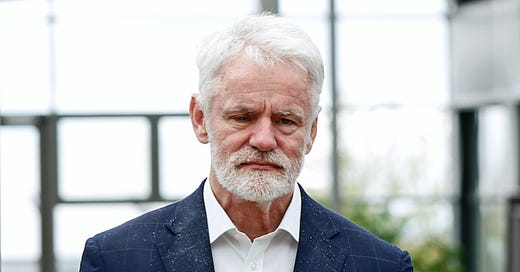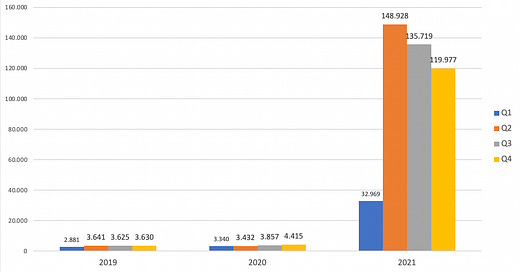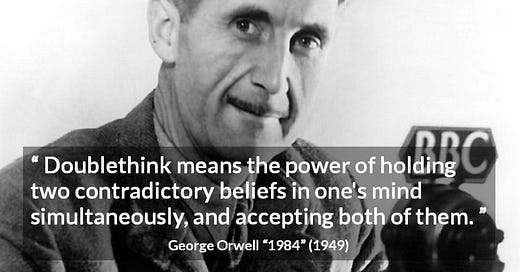

Discover more from From Symptoms to Causes
Are We Building a New Tower of Babel?
Why large language models may not only master our language, they may become its masters.
The other day I attended a conference hosted by an international software company. The presenters came from various countries, all speaking in English. English is the corporate language. But none of them were native English speakers, which was obvious. It made me think about how strange it is when people spend most of their time communicating in a language they don't fully know and can never really master. All the nuances are lost, all the linguistic creativity, the ambiguity, the unspoken words, the hidden sarcasm, and the secret humour.
Shortly after, I was coaching one of my students, a German software specialist who speaks quite decent English, but still, we spent a lot of time figuring out exactly what he meant by a particular paragraph. I asked him if he couldn't just tell me in German. "Do you speak German?" he asked. "Well, I learned it in high school," I replied, "but it might be a stretch to say that means I know German." Then we just laughed. Eventually, we managed to resolve the issue, in English, which neither of us speaks perfectly. Did we understand the paragraph in the same way? Surely not.
Being able to speak any language, but understand none
But now we have artificial intelligence. And whether we like it better or worse, AI is considerably better at English than almost every non-native speaker, and indeed a large part of those as well. The style is admittedly flat, but the same applies when people express themselves in a language they don't fully master. Soon, we can expect technology to have generally reached the level where in phone calls and remote meetings we can simply speak our own mother tongue, and let artificial intelligence instantly translate the content into any other language. The Swede working in the international software company then simply speaks Swedish to the Ukrainian or Frenchman, and they just hear the Ukrainian or French version and respond in their own language. And when Elon Musk or those others now working hard to develop brain chips have progressed further, it might even be enough to press a button on the remote brain control we will soon all carry, to switch languages and speak French, Ukrainian, Swahili, or Hindi as needed. But of course, without understanding a word of what comes out of our mouths.
The old Babel and the new
At first glance, this might seem like a great solution to ensure the future of small languages long under threat, such as my mother tongue, Icelandic. But not everything is as it appears.
According to an ancient story, mankind once all spoke the same language. Mankind was also full of self-confidence and undertook to build a tower that would reach the heavens, the Tower of Babel. But before the work was completed, higher powers knocked down the tower, scattered the nations across all corners of the earth, and, perhaps most importantly, confused their languages so that different nations stopped understanding each other.
Thousands of different languages are spoken in the world today. Some are very similar to each other, others far apart. And languages evolve. Their development is largely dependent on the contact with other languages through travel and migration. But this development also manifests in different speech patterns across generations. It's not long since some Icelandic teenagers banded together, following their own dismal performance on the universal PISA tests, and tested the adults in teen slang. The performance was no better on that test than on the PISA for the teenagers.
But over time, the vocabulary of the teenagers and the vocabulary of the adults merge. Thus, generations continue to understand each other as language evolves. And languages continue to evolve, not only through generational shifts but also due to constant contact with other languages.
But what if the future vision described above becomes a reality? Or rather, what when it becomes a reality? What when we stop understanding and using other languages, what when the teenager and the parent no longer have to try to understand each other, but can let technology handle the translation, and even expression itself?
To master something, or become its master
Language is the operating system of human society, as historian Yuval Noah Harari pointed out not long ago. Without language, our society would simply not exist. We often talk about the remarkable thing about large language models being how they have mastered language. In this sense, mastering something is about being able to use it effectively. But that’s not all there is to mastery; it may also refer to becoming master of something. This is what we need to consider now when it appears that the large language models, one of mankind's most significant discoveries, might soon mediate a large part of our communications, thereby gaining power over them. The ancient Tower of Babel might fade in comparison with this new one: This time it might not just be nations being scattered across all corners of the earth, understanding each other no more, it might be individuals.
The opportunities brought by the large language models are much bigger than most of us can yet imagine. But the same applies to the threats. And we need to realize how the main threat is not that unruly computer programs will exterminate humanity, of their own volition or under the control of evil political forces. The main threat from the large language models lies in the very opportunities they offer us. It lies in our own tendency to rely on them to make our lives easier, to avoid having to learn, to avoid taking responsibility for ourselves as free and thinking individuals.
To prevent artificial intelligence from not only mastering language but becoming its master, we need to fully understand this threat and be serious about how to address it. This must from now on become our primary focus:
We must strengthen our own mastery of language and expressive ability as much as possible, both in our own language and in other languages.
We must focus hard on developing our general capabilities in interacting with large language models.
More specifically we must enhance our own capacity for critical thinking and train ourselves in making use of the large language models to do so.
We must avoid using large language models to act as intermediaries in our communications, and resist the temptation to let them handle our communications for us.
No one will do this for us. We must do it ourselves, each and every one of us. This is the task ahead. And we must start right away. Will we?














These are very significant issues. The irony is that agricultural communities and less technologically developed nations will be in some degree protected from the effects of AI intrusion (and control)...
Excellent and original thinking.